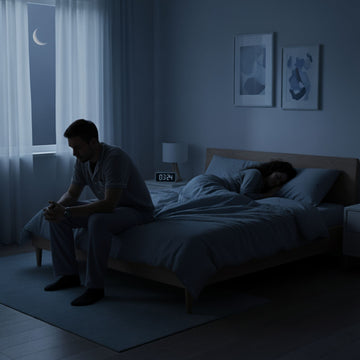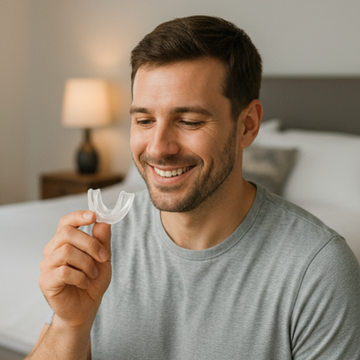Sleep is an essential pillar of good health, yet many people struggle with their sleep. As more people seek solutions, sleep trackers are a popular choice. But what exactly are sleep trackers? How do they work? And do they really offer benefits for those looking to improve their sleep quality or simply curious about their sleep data?
What is a sleep tracker?
A sleep tracker is a device or application that measures and analyzes your sleep. They are designed to provide insight into your sleep patterns and identify areas for improvement. You can find them in different forms, such as:
- Wearables : Devices such as smartwatches and fitness trackers that you wear on your wrist.
- Contactless trackers : Devices that you place under your mattress or on your nightstand.
- Apps : Smartphone apps that track sound and motion through your phone's sensors.
The goal is to help you understand how you sleep and how to optimize your sleep.
How do sleep trackers work?
Sleep trackers use technologies such as motion sensors (actigraphy) and heart rate measurements to collect data. They often measure the following aspects:
- Sleep Duration : How long you sleep per night.
- Sleep patterns : How much time you spend in different stages of sleep (light sleep, deep sleep, and REM sleep ).
- Movement : How much you move during your sleep.
- Heart rate and respiration : Some advanced trackers monitor vital signs for more in-depth analysis.
- Environmental factors : Humidity, temperature, or noise that can affect your sleep.
The data is collected and analyzed in an app, where you can often view it in clear graphs and reports.
Why use a sleep tracker?
1. Tackling poor sleep
If you regularly have trouble sleeping, a sleep tracker can help you discover patterns and causes. Maybe you’re not getting enough deep sleep, or external factors like noise are disrupting your sleep. With these insights, you can take targeted steps to improve your sleep.
2. Optimize sleep
Even if you don’t have trouble sleeping, a sleep tracker can be helpful. Many people use trackers to fine-tune their sleep routine and see how lifestyle changes (such as diet, exercise, or bedtime) affect their sleep quality.
3. Insight for health
Sleep has a direct impact on your physical and mental health. By tracking your sleep data, you can recognize trends and potentially identify health issues early.
Do sleep trackers really work?
The reliability of sleep trackers is a hotly debated topic. While they can provide valuable insights, they also have limitations:
Reliability
Most consumer sleep trackers are good at measuring general trends like sleep duration and movement. But for detailed analysis, like the exact time you spend in REM sleep, medical devices like a polysomnography (the “gold standard” for sleep studies) are still more accurate.
Advantages
Sleep trackers offer an accessible and affordable alternative to professional sleep research. They are especially useful for identifying patterns and motivating behavioral changes.
Limits
They can sometimes be inaccurate, especially when distinguishing between light sleep and waking. It is important to view the data as a guideline, not as a diagnostic tool.
Are sleep trackers also useful if you're just curious?
Absolutely! Many people are simply interested in learning more about their bodies and how sleep works. Sleep trackers offer a glimpse behind the scenes of your night’s sleep, which can be fascinating and motivating. Plus, tracking sleep data can be fun and informative, even if you’re not trying to solve a specific problem.
Tips for using a sleep tracker
- Choose a reliable tracker : Read reviews and choose a device known for its accuracy and ease of use.
- Be consistent : Use the tracker regularly to get a clear picture of your sleep patterns.
- Combine with healthy habits : Use the insights from your tracker to develop healthier sleep habits, like setting a regular sleep schedule or reducing screen time before bed.
- Be realistic : Don't expect perfect measurements. Use the data as a tool, not as a definitive source.
Conclusion
Sleep trackers are valuable tools for anyone who wants to know more about their sleep, whether you’re struggling with poor sleep or want to optimize your sleep habits. While they’re not perfect at measuring all sleep metrics, they can provide valuable insights that can improve your health and well-being.
What do you think?
Do you have experience with a sleep tracker, or are you considering one? Share your thoughts and tell us what you hope to discover!





